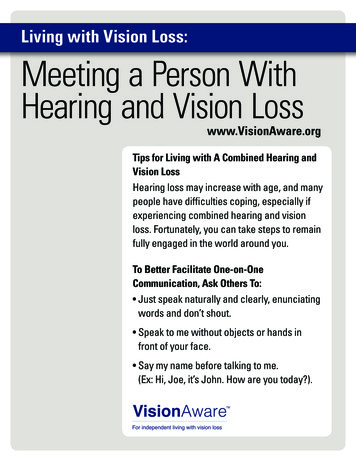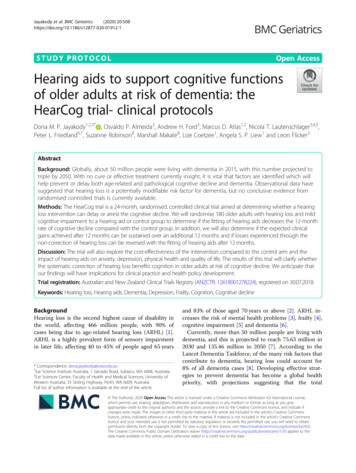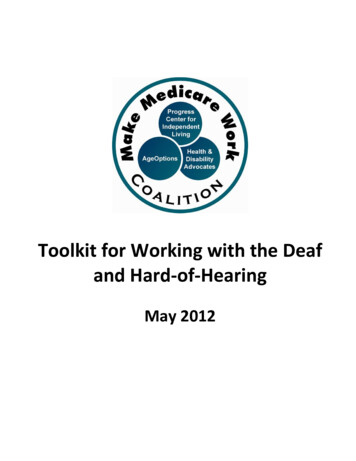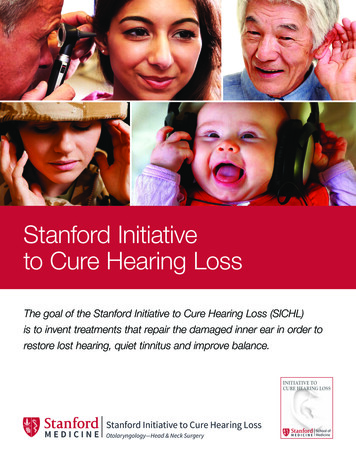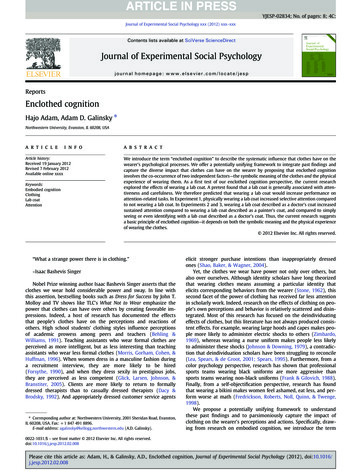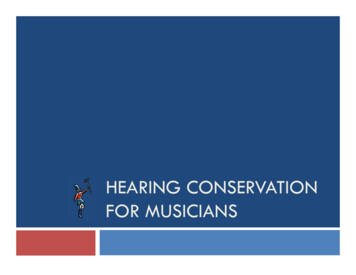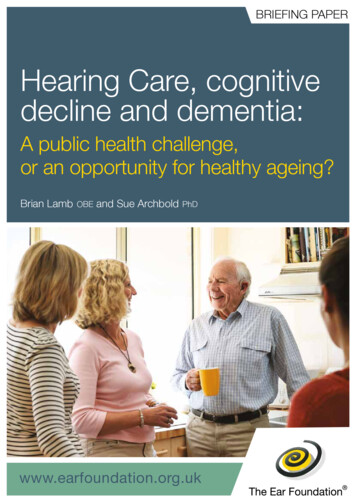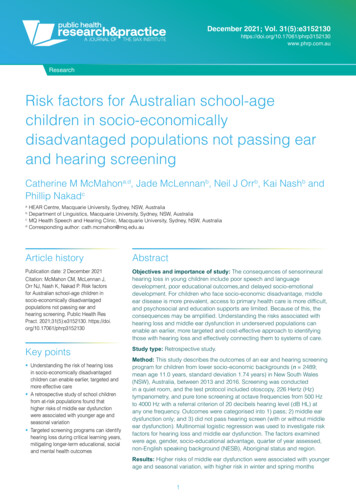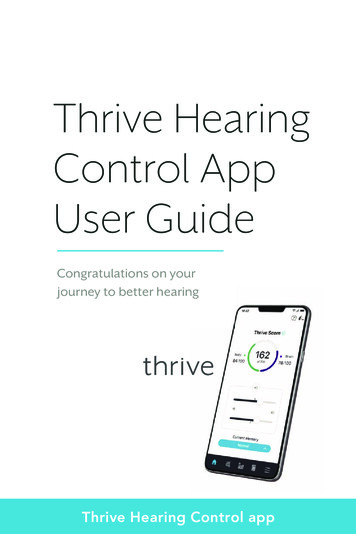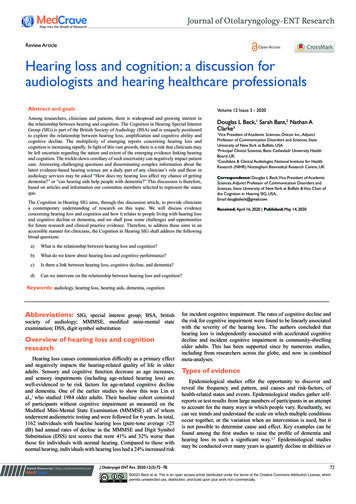
Transcription
Journal of Otolaryngology-ENT ResearchReview ArticleOpen AccessHearing loss and cognition: a discussion foraudiologists and hearing healthcare professionalsAbstract and goalsVolume 12 Issue 3 - 2020Among researchers, clinicians and patients, there is widespread and growing interest inthe relationship between hearing and cognition. The Cognition in Hearing Special InterestGroup (SIG) is part of the British Society of Audiology (BSA) and is uniquely positionedto explore the relationship between hearing loss, amplification and cognitive ability andcognitive decline. The multiplicity of emerging reports concerning hearing loss andcognition is increasing rapidly. In light of this vast growth, there is a risk that clinicians maybe left uncertain regarding the nature and extent of the emerging evidence linking hearingand cognition. The trickle-down corollary of such uncertainty can negatively impact patientcare. Answering challenging questions and disseminating complex information about thelatest evidence-based hearing science are a daily part of any clinician’s role and those inaudiology services may be asked “How does my hearing loss affect my chance of gettingdementia?” or “can hearing aids help people with dementia?” This discussion is therefore,based on articles and information our committee members selected to represent the statusquo.The Cognition in Hearing SIG aims, through this discussion article, to provide cliniciansa contemporary understanding of research on this topic. We will discuss evidenceconcerning hearing loss and cognition and how it relates to people living with hearing lossand cognitive decline or dementia, and we shall pose some challenges and opportunitiesfor future research and clinical practice evidence. Therefore, to address these aims in anaccessible manner for clinicians, the Cognition in Hearing SIG shall address the followingbroad questions:a)What is the relationship between hearing loss and cognition?b)What do we know about hearing loss and cognitive performance?c)Is there a link between hearing loss, cognitive decline, and dementia?d)Can we intervene on the relationship between hearing loss and cognition?Douglas L Beck,1 Sarah Bant,2 Nathan AClarke3Vice President of Academic Sciences, Oticon Inc., AdjunctProfessor of Communication Disorders and Sciences, StateUniversity of New York at Buffalo, USA2Principal Clinical Scientist, Betsi Cadwaladr University HealthBoard, UK3Candidate & Clinical Audiologist, National Institute for HealthResearch (NIHR) Nottingham Biomedical Research Centre, UK1Correspondence: Douglas L Beck,Vice President of AcademicSciences, Adjunct Professor of Communication Disorders andSciences, State University of New York at Buffalo & Vice Chair ofthe Cognition in Hearing SIG, USA,EmailReceived: April 16, 2020 Published: May 14, 2020Keywords: audiology, hearing loss, hearing aids, dementia, cognitionAbbreviations:SIG, special interest group; BSA, britishsociety of audiology; MMMSE, modified mini-mental stateexamination; DSS, digit symbol substitutionOverview of hearing loss and cognitionresearchHearing loss causes communication difficulty as a primary effectand negatively impacts the hearing-related quality of life in olderadults. Sensory and cognitive function decrease as age increases,and sensory impairments (including age-related hearing loss) arewell-evidenced to be risk factors for age-related cognitive declineand dementia. One of the earlier studies to show this was Lin etal.,1 who studied 1984 older adults. Their baseline cohort consistedof participants without cognitive impairment as measured on theModified Mini-Mental State Examination (MMMSE) all of whomunderwent audiometric testing and were followed for 6 years. In total,1162 individuals with baseline hearing loss (pure-tone average 25dB) had annual rates of decline in the MMMSE and Digit SymbolSubstitution (DSS) test scores that were 41% and 32% worse thanthose for individuals with normal hearing. Compared to those withnormal hearing, individuals with hearing loss had a 24% increased riskSubmit Manuscript http://medcraveonline.comJ Otolaryngol ENT Res. 2020;12(3):72‒78.for incident cognitive impairment. The rates of cognitive decline andthe risk for cognitive impairment were found to be linearly associatedwith the severity of the hearing loss. The authors concluded thathearing loss is independently associated with accelerated cognitivedecline and incident cognitive impairment in community-dwellingolder adults. This has been supported since by numerous studies,including from researchers across the globe, and now in combinedmeta-analyses.Types of evidenceEpidemiological studies offer the opportunity to discover andreveal the frequency and pattern, and causes and risk-factors, ofhealth-related states and events. Epidemiological studies gather selfreports or test results from large numbers of participants in an attemptto account for the many ways in which people vary. Resultantly, wecan see trends and understand the scale on which multiple conditionsoccur together, or the variation when an intervention is used, but itis not possible to determine cause and effect. Key examples can befound among the first studies to raise the profile of dementia andhearing loss in such a significant way.2,3 Epidemiological studiesmay be conducted over many years to quantify decline in abilities or72 2020 Beck et al. This is an open access article distributed under the terms of the Creative Commons Attribution License, whichpermits unrestricted use, distribution, and build upon your work non-commercially.
Hearing loss and cognition: a discussion for audiologists and hearing healthcare professionalsconditions1 or the difference between groups of people4,5 or in a group,pre-and-post intervention.6 Changes over time can also be studiedwith observational and experimental studies. These tend to be morespecific to the condition, such as observing cognitive changes overtime in those with hearing loss, and may use multiple groups at thesame time, such as people who choose to wear hearing aids, versuspeople who choose not to wear hearing aids. Again, “cause” cannotdirectly be inferred. However, it is well-evidenced that people whochoose to use hearing aids tend to have greater self-efficacy and socialinteraction even before they take up hearing aids.7 Alternatively, onecan account for this by studying people experimentally before andafter a change is made.8,9While attempting to gain conclusive answers to questions,researchers ideally turn to conducting randomized controlled trials(RCT). For example, RCTs may consider the benefits of hearing aid usefor cognitive performance, in which participants are assigned blindlyto either treatment or placebo groups. It is possible to set a hearing aidto a ‘placebo setting’.10 However, such studies encounter problemsin other ways. Firstly, the ethics regarding denying working hearingaids to willing participants for long enough to study the effect of thatdenial; the study that used placebo devices for this purpose limited thedelay in true hearing aid use to only 6 months for the control group.10Secondly, if focusing on those that are not interested in hearing aids,while ethically palatable, there tends to be poor compliance with thestudy conditions, i.e. participants effectively using the hearing aidsin their daily life.11 Ironically, it is this latter group of individuals thatare possibly the most interesting, being the least studied in terms ofcognitive decline, and those who might benefit most from healthyaging campaigns. Current RCT studies tend to compare hearing aiduse within differing models of rehabilitation in order to increaseunderstanding in a more ethical manner.12,13In the case of complex disorders and complex interventions,such as hearing loss and amplification, we may turn to qualitativeresearch. This is an approach in which we listen to the voice of theperson, i.e. people living with hearing loss and/or with dementia. Bydrawing from the experiences of people living with a disorder and/or using an intervention, we begin to understand the complexity ofthe landscape from different viewpoints, and either combine this withemerging quantitative evidence to better evidence hypotheses, or usethe experiential findings as a starting point for further enquiry. Theseapproaches have been used to understand the experiences of peoplewho are deaf and have dementia14 and people living with sensoryimpairment and dementia.15Measuring hearingIn addition to challenges from differing research methodologies,we are also limited by what we choose to measure. Typically, hearingis quantified based on pure tone thresholds. Nonetheless, we are awarethat the functional integration, capacity or outcome of the auditorysystem cannot be derived based solely on pure tone thresholds. Thatis, audiograms only reflect pure tone thresholds across a limitedspectrum (250-8000 Hz). Notably, these same pure tones are rarely,if ever, heard in the real world. Further, the end-game for humans isnot to simply hear/perceive artificial sounds, but is, to comprehendand apply meaning (primarily) to speech sounds; to listen. Indeed,“Listening is where hearing meets brain”.16 Listening is much morethan the threshold at which one perceives a pure tone. Listening occurswithin the brain and listening is the “end-game.” Listening is clearlybuilt on a foundation of hearing, yet listening involves cognition,Copyright: 2020 Beck et al.73attention, intention, vocabulary, processing ability, processing speed,working memory, short term and long-term memory and more, andoccurs within the brain itself.Although age-related hearing loss is typically characterised by lossof outer hair cells in the cochlea, which are reflected via the audiogram,arguably, the more important auditory phenomena happens afterthe sound (bio-electric energy) exits the cochlea and synapses withauditory nerve fibres and the resultant bio-electric signal is sent toboth superior temporal lobes of the brain, along the central auditorypathway. The stimuli may have substantial emotional impact whichmay involve the frontal lobes, and there may be redundant visualcues, thereby involving the occipital lobe and more for processingand interpretation. That is, for simple stimuli such as a pure tone, onemight argue the ability to perceive the stimuli is enough. However, forlanguage-based listening tasks, and to understand and apply meaningto speech sounds, interactions within and throughout the brain arevast, likely innumerable, and it is the brain’s interpretation of sound(from the ear) from which we derive meaning.Further, it is well-known that people with similar (or identical)hearing thresholds often have incredibly different abilities tocomprehend, understand or untangle sound into meaningful percepts.Further, speech recognition in quiet (SIQ) does not necessarilycorrelate with speech recognition in noise (SIN) and there is noconstant or predictable relationship between SIQ and SIN. Ofnote, although some 38 million people (USA) have hearing loss asdemonstrated on an audiogram, there are an additional 26 millionpeople17 who have hearing difficulty and/or SIN problems whichcause a multitude of problems with regard to small and large groupcommunication, depression, anxiety, stress, social isolation, quality oflife, and more. There are many possible reasons for hearing difficultieswithout the presence of peripheral hearing or specific central auditoryhearing disorders, one of which is cognitive ability.Measuring cognitionA similar situation is found with cognitive ability: despite theability to measure some “relatively specific” aspects (i.e., the “greatesthits”) of human cognition, information processing abilities such asshort and long-term and working memory, learning ability, attention,pattern recognition and more,18 we are at a loss to 100% thoroughly orentirely accurately define things like human consciousness and humancognitive ability. This poses an additional challenge when specificallyconsidering cognitive ability related to hearing, or the interactionbetween cognitive decline and hearing loss. Boogert, Madden andcolleagues19 stated “ cognitive abilities cannot be directly observed,they must be inferred ” The authors state all animals learn, rememberand integrate sensory provided information to achieve decisions anddetermine behaviours. However, how, why and when these cognitiveabilities evolve and mature is a mystery, with significant inter andintra-individual variation. In essence, whichever cognitive attributewe measure in an individual at a given moment in time, likely doesnot represent their entire cognitive ability, and importantly, whateverthe outcome of that measured attribute happens to be, it can changeover time. That is; the measurement of sub-skills only measuresthe particular sub-skill at a given moment in time. Sub-skills suchas perception, memory, math or verbal skills are important, are veryuseful to compare the ability of individuals within that same domain.However, the ability to predict overall cognitive ability based on oneor multiple sub-skills is not a proven attribute.Citation: Beck DL, Bant S, Clarke NA. Hearing loss and cognition: a discussion for audiologists and hearing healthcare professionals. J Otolaryngol ENT Res.2020;12(3):72‒78. DOI: 10.15406/joentr.2020.12.00459
Hearing loss and cognition: a discussion for audiologists and hearing healthcare professionalsRowe and Healy18 reported that variability in a cognitive task doesnot necessarily demonstrate individual variation in cognitive ability.They report that demonstrating more memory, faster learning or finerdiscriminations may not always be better - and indeed, they cautionedwe need to design more stringent tests and we must be more cautiousregarding interpreting results. Furthermore, recent work suggeststhat the types of cognitive test may be important for successfullyunderstanding associations between complex constructs such ashearing and cognition. For example, in a recent systematic reviewand meta-analyses of associations between tinnitus and cognitiveperformance, Clarke et al.,20 found that complex tasks requiringcognitive control and executive functioning demonstrated reliableassociations with tinnitus. Given previous equivocal and mixed resultsfrequently reported within the literature, this analysis demonstratesthat cognition is not a monolithic construct and it is crucial to givedue consideration to which elements/sub-skills are being measured.With an understanding of the types of evidence available and thevarious ways that cognition and hearing loss can be measured, we canreturn to the discussion questions posed earlier. In order to presentthe current evidence available, the Cognition and Hearing SIG hasselected evidence-based discussions drawn from topics of interestexpressed during various clinical encounters, and have summarizedthe latest understanding on these, along with examples of recentresearch relating to these topics.Discussion questionsWhat is the link between hearing loss and cognition?Even among experts, the word ‘cognition’ is understood in a varietyof different ways depending on the context in which it is used; someexperts use the term to refer to the contents of thoughts, while othersuse it to refer to the efficiency of thought processes.21 Further, it isimportant to distinguish between cognitive performance and cognitivedecline. Decrements in cognitive performance through auditorydeprivation can be subtle, and are experienced by most individuals.Cognitive decline encompasses mild cognitive impairment (MCI) anddementias and neuro-cognitive disorders, which occur when cognitiveperformance is functionally impaired as indicated and measuredthrough screening protocols and questionnaires and diagnostic tests(respectively), and is typically corroborated with medical imaging.When we discuss the link between hearing and cognition, we’retypically addressing the difference between ‘hearing’ with the ears,and ‘listening’ with the brain (see above). As such, fundamentally,the function of the ears is to transduce a signal to the brain, whichsubsequently processes it and assigns meaning to it, through theact of cognition. Another context we are typically interested in isthe relationship between hearing loss and cognitive performance.However, cognition is known as a latent variable and cannot bedirectly observed. Cognition is typically measured using establishedcognitive and neuropsychological tests. Regarding hearing loss andcognitive decline, epidemiological and longitudinal studies exist thathave followed and assessed patients over the course of their liveswith reports of an accelerated cognitive decline with advancing agein older adults with hearing loss when compared to those with nohearing loss. Recently, Amieva and Ouvard22 reported that despitemultiple caveats (the scarce number of studies, contrasting results, theabsence of interventional studies such as random controlled studies)“the available data globally support the hypothesis that hearing aidsCopyright: 2020 Beck et al.74have a positive impact on long-term cognition in older adults sufferingfrom hearing loss.” Glick and Sharma7 reported Age Related HearingLoss (ARHL) is associated with cognitive decline and functional andstructural brain changes. They determined that multiple deficits wereimproved after 6 months of daily hearing aid use, providing strikingevidence of compensatory cortical neuroplasticity. In particular theynoted a reversal in cross-modal reorganization, as well as gains inspeech perception and cognitive performance.Further, various scientific links and hypotheses have been proposedbetween hearing loss and cognition to explain how hearing loss maylink to progressive cognitive decline and also dementia:1. Common causes: Both hearing loss and cognitive decline sharingthe same widespreadneurodegenerative causes.2. Cascade via social effects: The experience of hearing losscascading into social disengagement, loneliness and depression,cascading to accelerated brain atrophy and accelerated cognitivedecline and dementia.3. Cascade via auditory deprivation: Auditory deprivationresulting in impoverished cortical input, causing neuroplasticchanges, cascading into cognitive decline and dementia.4. Cognitive load: Hearing loss causing cognitive resources to bediverted from memory function into auditory processing, adding tothe cognitive load, and leading to cognitive decline and dementia.Of note, hypotheses 2, 3 and 4 (above) are of causal effects,whereas the first is co-occurring and not due to auditory deprivationfrom hearing loss per se. Livingston et al.,23 explain that older agefactors and microvascular pathology increase the risk of both dementiaand peripheral hearing loss and the presence of this might, therefore,confound any causal associations. Indeed, hearing loss has beendescribed as a marker for poor health; those with unhealthy lifestyles(smoking, alcohol, poor diet, lack of exercise) being at greater risk ofhearing loss and of cognitive decline/dementia.24 It is reasonably clearfrom these two hypotheses that “hearing impairment is not good forthe brain”25 and rather than one single hypothesis being correct, thetrue picture may be a combination of multiple hypothesis. Uchida etal.,26 concluded it is likely that multiple mechanisms occur in differingextents for each person.What effect does hearing loss have on cognitiveperformance?Difficulty understanding speech in the presence of backgroundnoise is the most common complaint among those with hearing lossand listening difficulty. Struggling to perceive speech in the presenceof competing sound, may be due to a peripheral hearing loss that canbe supported with hearing aids, or indeed a disorder of the centralauditory pathway; however, it may instead or additionally be acognitive issue. As mentioned previously, although effects may besubtle, laboratory studies have effectively demonstrated that auditorydeprivation can impair cognitive performance. For instance, seminalstudies have shown that even for normal hearing individuals, areduction in the signal-to-noise ratio can reduce a person’s memoryfor spoken words.27,28 These remarkable findings are particularly truefor people with hearing loss, with similar experiments showing thatadults with hearing loss perform more poorly compared to thosewithout.29,30Citation: Beck DL, Bant S, Clarke NA. Hearing loss and cognition: a discussion for audiologists and hearing healthcare professionals. J Otolaryngol ENT Res.2020;12(3):72‒78. DOI: 10.15406/joentr.2020.12.00459
Hearing loss and cognition: a discussion for audiologists and hearing healthcare professionalsWhen considering the effect that hearing loss has on cognitiveperformance, we may consider which areas of cognition may displaypoorer performance in challenging, noisy conditions. Dryden et al.,31completed a meta-analysis of 25 studies assessing associations betweencognitive performance and speech-in-noise (SIN) perception. Theyreported overall association between cognitive performance and SINperception was a moderate positive correlational relationship (r .31)For component cognitive domains, the association with (pooled)SIN perception was as follows: processing speed (r .39), inhibitorycontrol (r .34), working memory (r .28), episodic memory (r .26),and crystallized IQ (r .18). Similar associations were shown forthe different speech target and masker types. However, a crucial andmore familiar aspect of this relationship for clinicians is the nature ofthe hearing loss that is being considered. For example, presbycusisis the most prevalent form of hearing loss and Rogers and Peele32note that a resilience to age-related decline in some memory systemsmay play an important role in speech perception and subsequent agerelated cognitive performance in acoustically adverse and challengingconditions. Further, the issues at hand may not be limited bytraditional categories/degrees of hearing and hearing loss. In somepopulations, it appears that even for people within “normal hearingcategories,” as hearing ability decreases along the continuum from“excellent” hearing to “normal” hearing, specific measurable aspectsof cognition decrease.33 That is, among people classically consideredto have normal hearing, as their hearing ability decreases, so too, doescognition, in a clinically meaningful way.However, evidence can be mixed when taken out of the laboratory.For example, Mamo, Reed, Sharrett et al.,34 reported on older adults(mean age 78 years) in whom poorer cognitive performance (withspecific regard to memory, language, executive functioning and globalfunction) was associated with worse speech-in-noise performance,regardless of hearing thresholds and demographic and disease factors.The authors suggest the possibility that people with more significanthearing loss than those in the study would be more impacted by theircognitive processing abilities given their greater hearing challengesof understanding speech-in-noise. While Gaeta, Azzarello, Baldwinet al.,35 examined the effect of audibility on the Mini-Mental StateExamination (MMSE) and concluded reduced audibility does indeed,have a negative effect on MMSE scores in “cognitively intact”participants.Is there a link between hearing loss, cognitive decline,and dementia?Perhaps the most pressing concern for patients with hearing loss isunderstanding whether having hearing loss will increase their chanceof cognitive decline and ultimately lead to dementia. Deal, Betz, Yaffeet al.,36 reported a 10 dB increase in hearing thresholds may indicatea clinically meaningful 14% increased risk for dementia. Theyconcluded that hearing loss is associated with an increased risk ofdeveloping dementia in older adults. Livingston, Sommerland, Ortegaet al.,23 reviewed that evidence base at the time and were unable tofind systematic reviews on hearing loss and dementia. The authorspooled the results from three relevant primary studies, and noted thathearing loss was a significant risk factor for dementia. Livingstonand colleagues suggested that approximately two thirds of dementiarisk is genetic and one third of dementia risk is likely attributableto a combination of nine risk factors; education to a maximum ofage 11–12 years, midlife hypertension, midlife obesity, hearingloss, late life depression, diabetes, physical inactivity, smoking, andsocial isolation. Among the 9, hearing loss was found to be the mostCopyright: 2020 Beck et al.75significant factor, with a Population Attributable Factor (PAF) of9%. They stated that the mechanism underlying cognitive declineassociated with peripheral hearing loss was not yet clear; nor was itestablished from the evidence whether ‘correction’ of hearing, suchas with hearing aids, can prevent or delay the onset of dementia. Thispaper was welcomed by audiology clinicians for its synthesis of theevidence on the risk resulting from hearing loss, placed in the contextof the risks from other disorders, which helps highlight hearing lossas a key modifiable disorder, i.e. one that individuals concerned aboutdementia can take action to change. At the same time, researcherscautioned against leaping to the conclusion that adopting hearing aidsreduces the risk by this amount.37Yuan, Sun, Sang, Pham and Kong38 published a meta-analysisof 11 cohort studies to assess published evidence for an associationbetween peripheral hearing function and central hearing functionwith cognitive impairment in older adults (defined as a cohort meanage of 60 years old or greater at baseline). Pooled results indicatedthe risk of cognitive impairment for those with moderate to severehearing impairment (average PTA 40dB HL) was 29-57% greaterthan those with normal hearing. For all participants with averagehearing thresholds of 25dB HL, the risk of cognitive impairment was29% greater compared to those with no hearing impairment. A doseresponse trend was found between peripheral hearing function andcognition, whereby for every 10 dB increase in hearing loss, there wasan estimated 12% increase in the incidence of cognitive impairment.The authors reported their findings support the contribution ofperipheral and central hearing dysfunction to the risk of cognitiveimpairment in the older population. Further, the association betweencentral hearing dysfunction and cognitive impairment was strongerthan the association between peripheral hearing dysfunction andcognitive impairment.Jafari, Kolb and Mohajerani39 reviewed the literature and reportedthat age-related hearing loss is the third leading cause of chronicdisability in older adults, and has been shown to be associated withpredisposing cognitive impairment and dementia. The authors statethe likelihood of significant hearing loss (average PTA 25 dB HL)for people ages 60-80 years is approximately 25%, and for thoseaged 70 years and older, 65%. They note a large body of evidencedemonstrates age-related hearing loss is detrimental to physical andmental health, cognition, independence, social interaction, and qualityof life in the elderly and hearing loss can precipitate early landmarksof dementia and Alzheimer’s disease. As hearing loss increases, itmanifests via profound consequences on verbal communication, andsocial, functional, and psychological well-being of the person. Hearingloss, depression, and anxiety are considered as the leading causes ofdisability worldwide, and can promote the occurrence of one another.The authors report hearing loss is associated with a multitude of healthoutcomes, similar to those identified for depression, anxiety, andstress, such as increased risk of cognitive impairment and dementia,reduced quality of life, low level of activity, frailty, social isolation,and poor general health. Dysfunction in social communication can beseen in individual’s inability in coping with stressful situations andin managing personal, interpersonal, or geographic environments.Hearing loss, which is a source of stress and mental fatigue, can leadto social isolation and subsequent depression which may predisposeindividuals to cognitive decline.With due consideration, the above findings represent multiplesignificant issues for clinicians; having to provide amplification andimprove the quality of hearing for those who are already experiencingCitation: Beck DL, Bant S, Clarke NA. Hearing loss and cognition: a discussion for audiologists and hearing healthcare professionals. J Otolaryngol ENT Res.2020;12(3):72‒78. DOI: 10.15406/joentr.2020.12.00459
Hearing loss and cognition: a discussion for audiologists and hearing healthcare professionalscognitive decline. It is well-known that a high percentage of thoseattending dementia assessment services have hearing loss. Allen etal.,40 found 87% of those attending dementia assessment had hearingloss on measurement and 80% were unaware of this. Livingston etal.,23 Uchida et al.,26 Ray et al.,41 and Panza et al.,42 discuss the waysin which hearing loss may directly affect diagnosis and experienceof dementia. This may be even more of an important clinical issuewhen cognitive assessments are instructed and/or performed verbally.This may also be a real experience of hearing loss exacerbating ormimicking symptoms of dementia, with many similarities shared suchas in communication and language skills, ability to complete tasks ofdaily living independently, poor access to social and environmentalcues, etc. Conversely, the same four papers also include thatneurodegeneration with Alzheimer’s Disease may result in increasedhearing challenges in higher parts of the brain. Everyday effects of thismay include reduced understanding of speech in noisy environmentsor with competing speakers, poorer concentration and attention,and a greater chance of overload from sounds. The authors suggest/recommend that, as this presents in early stages, hearing
such as hearing loss and amplification, we may turn to qualitative research. This is an approach in which we listen to the voice of the person, i.e. people living with hearing loss and/or with dementia. By drawing from the experiences of people living with a disorder and/ or using
